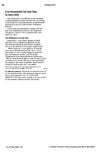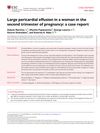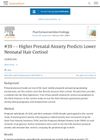 2 citations,
July 2021 in “Journal of Dermatology and Dermatologic Surgery”
2 citations,
July 2021 in “Journal of Dermatology and Dermatologic Surgery” Exposure to the hair loss drug finasteride during pregnancy can cause genital anomalies in male babies, but not in female babies. It's best to avoid this drug in women who could potentially become pregnant.
February 2024 in “Animals” Hair loss peaks in spring and regrowth in late summer, with pregnant females losing the most hair.

Surgery can be a safe and effective option for infertile women with PCOS who don't respond to medication and want to get pregnant.
 October 2010 in “Reproductive Biomedicine Online”
October 2010 in “Reproductive Biomedicine Online” Women with pituitary adenomas often have reproductive issues, like irregular periods and trouble getting pregnant, but not always breast milk production without pregnancy.
 25 citations,
July 2013 in “Actas Dermo-Sifiliográficas”
25 citations,
July 2013 in “Actas Dermo-Sifiliográficas” Acitretin is effective for severe psoriasis and can be used long-term due to no immunosuppression, but must be carefully monitored for side effects and is not for pregnant women.
 24 citations,
March 2003 in “Best Practice & Research Clinical Endocrinology & Metabolism”
24 citations,
March 2003 in “Best Practice & Research Clinical Endocrinology & Metabolism” Androgens, male hormones, play a role in both men and women's health, and testosterone therapy can help women with low levels, but it's not suitable for pregnant or lactating women, or those with certain conditions.
 16 citations,
March 2018 in “Seminars in Oncology”
16 citations,
March 2018 in “Seminars in Oncology” The document concludes that pregnancy and cancer share immune evasion tactics, but more research is needed before using checkpoint blockade immunotherapy in pregnant cancer patients to avoid harm to the placenta.
 9 citations,
March 2011 in “PubMed”
9 citations,
March 2011 in “PubMed” Spironolactone is used in dermatology to treat skin conditions related to hormones, but is not safe for pregnant women or men.
 December 2023 in “Siriraj Medical Journal”
December 2023 in “Siriraj Medical Journal” 5% Azelaic acid is as effective as 2% Minoxidil for female pattern hair loss and could be an alternative for those allergic to Minoxidil or pregnant.
 November 2020 in “Elsevier eBooks”
November 2020 in “Elsevier eBooks” Antiandrogens and androgen inhibitors like spironolactone, finasteride, and dutasteride can treat hair loss and skin conditions, but they have risks and side effects, including potential harm to pregnant women and risks of cancer and heart issues. Herbal remedies also have antiandrogenic effects but lack safety validation.
 19 citations,
August 2000 in “International Journal of Dermatology”
19 citations,
August 2000 in “International Journal of Dermatology” Minoxidil and finasteride can slow or halt hair loss, but may have side effects.
 1 citations,
May 1998 in “Inpharma Weekly”
1 citations,
May 1998 in “Inpharma Weekly” Finasteride works for male hair loss only.
 1 citations,
June 2014 in “International Journal of Dermatology”
1 citations,
June 2014 in “International Journal of Dermatology” Pregnancy can trigger follicular mucinosis, which may resolve after delivery.
 February 2024 in “European heart journal. Case reports”
February 2024 in “European heart journal. Case reports” Early surgical intervention and a multidisciplinary approach are crucial for managing complex cardio-obstetric patients.
180 citations,
October 2019 in “British journal of haematology” Early detection and treatment of iron deficiency in pregnancy are crucial for maternal and infant health.
 February 2024 in “Psychoneuroendocrinology”
February 2024 in “Psychoneuroendocrinology” Higher prenatal anxiety is linked to lower cortisol levels in newborns' hair.
 June 2021 in “International Journal of Research in Dermatology”
June 2021 in “International Journal of Research in Dermatology” Women with acne and PCOS should be checked for insulin resistance and related symptoms.
 35 citations,
December 2009 in “Human reproduction”
35 citations,
December 2009 in “Human reproduction” Metformin taken during pregnancy increases SHBG in newborns but doesn't change other hormone levels in mothers or babies.
 20 citations,
June 2012 in “Human Reproduction”
20 citations,
June 2012 in “Human Reproduction” Women with polycystic ovarian syndrome are more likely to have cervical insufficiency, especially South Asian and Black women.
 8 citations,
April 2020 in “European Journal of Nutrition”
8 citations,
April 2020 in “European Journal of Nutrition” Newborns' hair shows how much caffeine their mothers drank during pregnancy.
 3 citations,
June 2018 in “International Journal of Clinical Pharmacy”
3 citations,
June 2018 in “International Journal of Clinical Pharmacy” Baby born healthy despite mom taking finasteride, but more research needed.
November 2024 in “NeoReviews” Pallister-Killian Syndrome is a complex genetic disorder requiring coordinated care and genetic counseling.
 May 2024 in “Journal of trace elements in medicine and biology”
May 2024 in “Journal of trace elements in medicine and biology” Overweight or obese women before pregnancy have lower iron levels in their serum and hair during early pregnancy.
 October 2023 in “Journal der Deutschen Dermatologischen Gesellschaft”
October 2023 in “Journal der Deutschen Dermatologischen Gesellschaft” Pregnancy can trigger severe rosacea, which may be treated with antibiotics and steroids, but there's no clear treatment guideline.
June 2020 in “Authorea (Authorea)” First-time mothers had higher stress hormone levels in late pregnancy than mothers who had given birth before.
53 citations,
January 1986 in “Endocrinology” Blocking a specific enzyme in male rat fetuses leads to the development of nipples and feminized genitalia.
 3 citations,
January 2020 in “Indian Dermatology Online Journal”
3 citations,
January 2020 in “Indian Dermatology Online Journal” Skin problems in patients with polycystic ovarian disease are linked to body weight, blood sugar, and hormone levels.
 2 citations,
January 2014 in “International Journal of Endocrinology”
2 citations,
January 2014 in “International Journal of Endocrinology” Women with a certain type of tumor had higher levels of pregnancy hormone and male hormones, which decreased after treatment.
 1 citations,
January 2015 in “Journal of Clinical Toxicology”
1 citations,
January 2015 in “Journal of Clinical Toxicology” Babies were mostly born healthy from fathers who took finasteride, but some pregnancies ended early; more research is needed.
 February 2023 in “Pakistan Journal of Medical and Health Sciences”
February 2023 in “Pakistan Journal of Medical and Health Sciences” Pregnancy can cause various skin changes, with stretch marks, dark lines on the abdomen, and skin darkening being the most common.
























